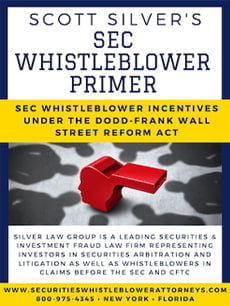The Securities Exchange Act of 1934
The Securities Exchange Act of 1934 prohibits market participants from committing fraud in the trading, purchase, and sale of securities in secondary markets. Whereas the Securities Act of 1933 covers the initial issuance of securities, the Securities Exchange Act of 1934 governs what happens after that as securities are traded and resold from investors to intermediaries and from such intermediaries to other investors. Known as the 34 Act, it also provides investors with the right to sue perpetrators to recover losses resulting from fraud.
Common Forms of FraudAlthough securities fraud is aggressively pursued and is a well-known violation of securities laws, a small number of bad actors continue to engage in it. The most commonly prosecuted forms of such fraud are follows:
- misrepresentation of material information about potential investments;
- omission of material risks or other information relevant to the purchase of a security;
- manipulation of market prices of securities;
- theft or embezzlement customer funds;
- insider trading of securities; and
- Ponzi or pyramid schemes.
The 34 Act created the Securities and Exchange Commission (SEC) to enforce and administer federal securities laws and to oversee the various securities exchanges. The 34 Act requires that the SEC be provided with various information on behalf of investors, including:
- accurate and complete annual reports, quarterly reports, and other updates of significant events; and
- purchases of more than five percent of a company’s outstanding shares, whether such purchase occurs directly or by tender officer.
Whistleblowers can play an important role in helping the SEC identify and prosecute violations of the 34 Act or other provisions of federal securities laws, yet whistleblowers can experience challenges as cases proceed through the enforcement process, which can often be lengthy and complicated. This requires experienced SEC whistleblower lawyers to provide strategic advice, support, and a watchful eye.
Attorneys Scott Silver and David R. Chase are nationally recognized securities lawyers. They have extensive experience representing SEC whistleblowers.
Contact UsIf you think you qualify as a whistleblower for the SEC, contact us at 1-800-975-4345. You can also reach out online.
 Silver Law Group Home
Silver Law Group Home
